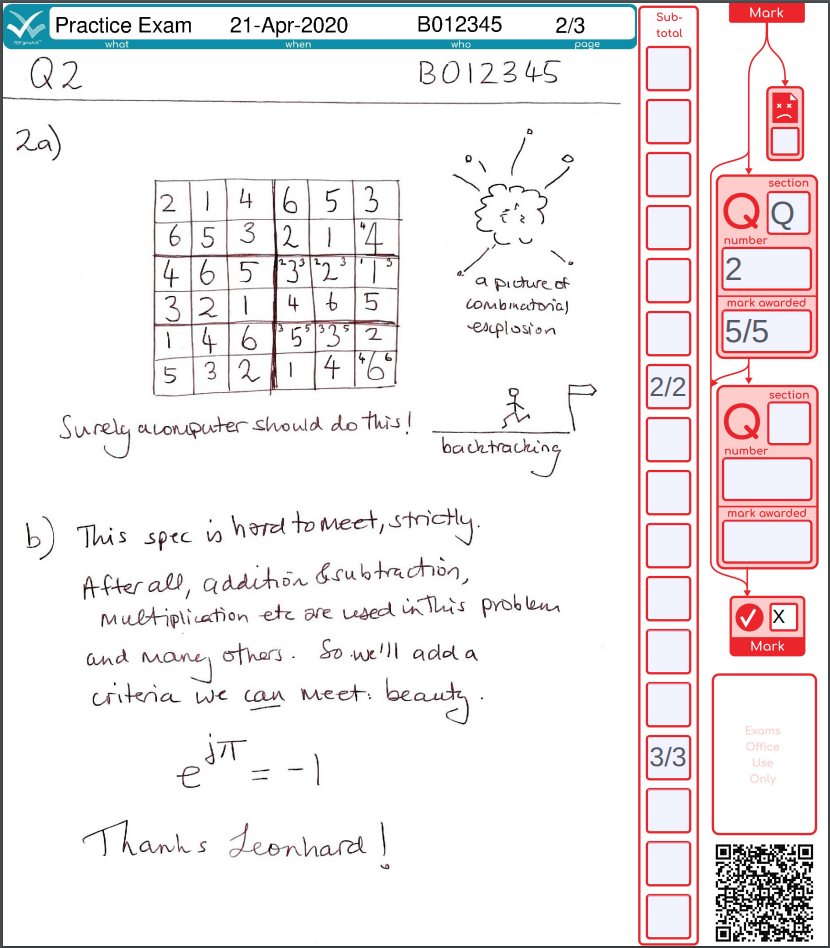oh… this will be just like marking on paper, maybe even quicker
an academic colleague
pdf.gradex™ started life in April 2020 as a rapid response to the challenge of getting 50 colleagues to remotely mark 65,000 pages of scanned exams. When wrestling with the best way to get the job done in double-quick time, a bunch of exciting possibilities surfaced – why stop at a one-off patch when we can really benefit in the long term, as an academic community, if we build the tools that suit our local context and help others to do the same?
Edit: just over two months on (June 11), this project is nearing completion of the first phase of development – just a few features to go and a few exams to finish off processing. Here’s an animation that is taken from the git repositories associated with the project, giving an idea of how I managed risk by developing critical features in isolation, then bringing them together in the integrated tool:
What’s in a name?
The X in gradex™stands for
- X as in “multiply your marking power” (automate tedious stuff);
- X as in “you can mark anything” (on paper now, others later)
- X as in connectivity networks between different marking tools;
- X as in “no to surveillance” (you control all your data);
- X for the variable page size in the first tool pdf.gradex™.
This pdf workflow is just the first “sub-domain” in a broader vision.
But – solved problem, right?
Yep, commercial marking systems are available, but there are good reasons not to settle for them. One of them is that sharing student work with third parties is a sensitive topic. This project aims to make it possible for institutions to keep that data in-house, where it belongs, yet still make significant efficiency, quality and equality improvements to their process. That’s keeping the lights on. What about getting the party on? By putting our code where our mouths are, we can explore the tensions between the latest world-leading research in education and the practical implications of those philosophies and values, without having to somehow keep a boardroom happy too. And how do we invite everyone to party in a way that suits them, or a no-party if that’s your preference? Digital tools always bake-in cultural norms, whether you are aware of it or not. Open-source (with a diverse community) is a necessary condition to overcome that. Of course, “necessary is not sufficient”, but we can’t start without open-source software that underpins the local and wider community. We have a long journey ahead to ensure equality, diversity, and inclusivity for all in education, and education is driven by assessment, so let’s keep that lever out in the open where we can see it and evolve it.
Project status:
- Proof of Concept and initial sense-check with colleages – done
- Phase one feature-set implementation (marking)- done
- Initial focus sessions with alpha testers – done
- Initial trials with beta testers –done
- Intended first use done (5000 pages processed so far in one day)
- Round two feature set implementation (reporting) done
- Round three feature set done (front cover pages, entering, moderation, cross-referencing of all pages)
- Many more pages processed by a team of two … need to count them!
- Now the default option in another School too
Risk management
This system is decoupled completely from student submissions, so we can get on with receiving scanned electronic papers then bring this system in behind that to ease the workflow for markers and administrators. There is no lock-in, because it is just pdf – you can go back to the default human-intensive solution at any time (not that you will want to!)
Potentially interested?
Drop timothy a line (admin AT gradex DOT io) if you want early sight of in-development materials and some chat. Code freely shared already – documentation stills need backfilling, but the initial pre-release version of the command-line version of the tool is on github. If you want to see details of the how things work under the hood, see the parsesvg library for how pages are designed in Inkscape.

2 replies on “pdf.gradex™”
Hi Tim,
what a great idea! I would like to share this with my golleagues with Twitter. May I use one of you example pictures?
Sure, fire away 🙂